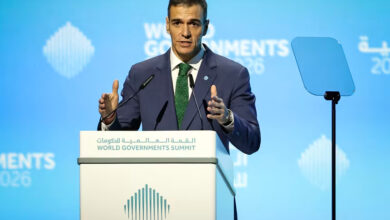I don’t love football, which is the most famous game in the world. I don’t read news about football in the papers. (Well, only a little.) The Egypt-Algeria World Cup qualifying match in Cairo was quite possibly the only match I ever watched in my life. There was a feeling, at that time, that you would miss something important if you didn’t watch it. When I followed my feelings, and the feelings of others, I realized that they were false, and that one can live properly without watching the Egypt-Algeria game, or any other Egypt match.
When Hossam Badrawi knew a week ago, that I was travelling to Spain–Barcelona specifically, the most important, famous, elegant, and clean city–he advised me to to watch the Barcelona-Inter Milan match, and I understood that watching this kind of game, especially watching it there in the stadium, would be a true pleasure and would show me the difference between our football and their football, as well as how it is not–for them–“just a match,” as it is for us just entertainment and a break for both the brain and one’s affection.
For some reason, I didn’t take Badrawi’s advice. When I was in Barcelona, the game had already been played. The result was tragic for the club named after the city, but Inter Milan are now able to play against the German team Byron Munich in Madrid on 22 May for the European Champion Clubs’ Cup. Barcelona won the championship last year, and was fighting to retain it this year, to be one of the very rare clubs in Europe to hold the championship for two consecutive years. But Inter Milan destroyed that hope, clinching the victory and reaching the final for the first time since 1972.
Barcelona had a sad night after the game. Sadness was clear on people’s faces in the streets, and if you had been there, you would have sensed how the people felt defeated. But still they behaved in a civilized manner: None of the players went home with four stitches in their head as did Wael Gomaa after the Ahly and Libyan Ettihad match. And none of Barcelona’s players hit any of Milan’s players with stones or chased them through the streets, as happened after the Egypt-Algeria game in Sudan.
It may be because of their accumulation of experience in this field that football, at some point, has become part of civilization and culture.
What was surprising is that Real Madrid, the major competitor of Barcelona in Spain, like Ahly and Zamalek in Egypt, was very happy after Barcelona was defeated, and didn’t hide the fact that they were happy, but announced it to the public. Some of their supporters took to the streets expressing their happiness, saying that Madrid can now sleep in peace because it’s guaranteed that Barcelona’s supporters won’t come to Madrid on 22 May making a lot of noise.
Real Madrid’s behavior was strange, and shows how football without competition turns into rivalry among two teams. I don’t know why I felt that Real Madrid’s behavior–being happy that its competitor was defeated–was close to the National Democratic Party’s logic in policy. It doesn’t want, until now, other competitors, so policy loses its taste; victory, however, also loses its taste, because it remains victory without war.




